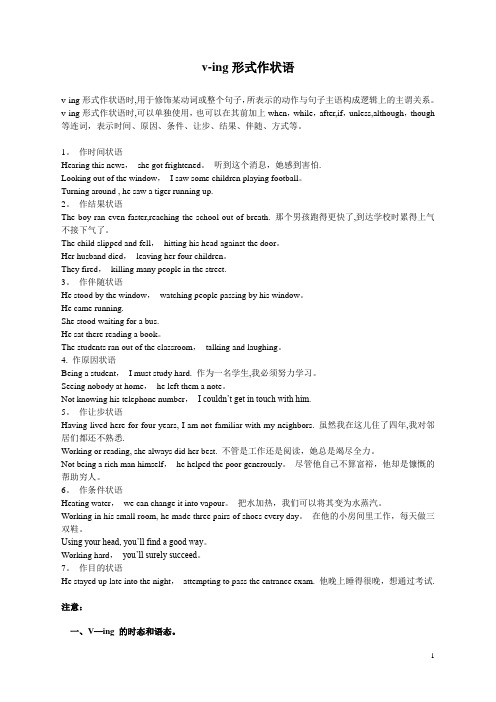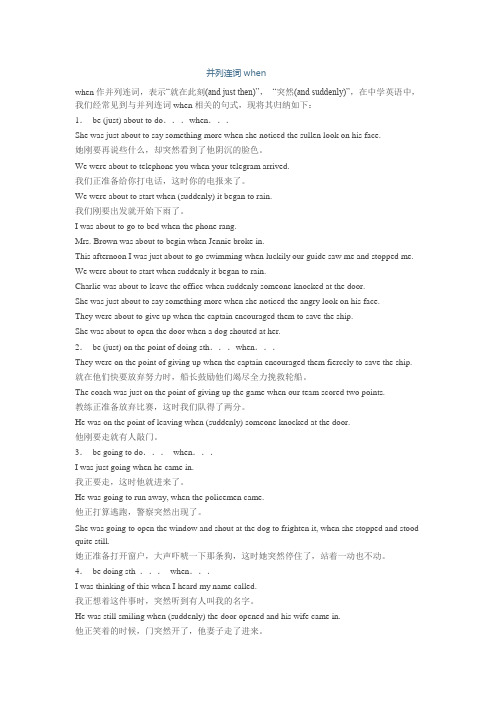whendoing的用法.doc
when doing sth的用法

when doing sth的用法当人们在英语中讨论某些动作或活动时,经常使用“when doing sth”的结构。
这种用法表示在进行某项任务或活动的同时发生了另一个事件。
这个结构可以用来描述各种情况,比如做家务,锻炼,读书,吃饭等等。
本文将详细介绍“when doing sth”的用法和几个例子。
一、基本结构“when doing sth”的基本结构是when + 动名词。
例如:- When reading a book, I always make notes. - When watching a movie, I prefer to have popcorn. - When cooking dinner, I usually listen to music.这个结构可以用来描述任何我们在做某件事情的时候发生的事情。
下面是一些更多的例子:- When driving to work, I always listen to the radio. - When studying for exams, I find it helpful to quiz myself. - When shopping for clothes, I usually try on a lot of different items before I make a decision. - When hiking in the mountains, I always carry a map and compass. - When preparing apresentation, I like to practice in front of a mirror.二、when doing sth的含义“when doing sth”是一种描述同时发生的事件的语法结构。
它强调在某个时刻或某个活动进行时,另一个事件会发生。
例如,当我们正在准备晚饭时,手机会响起。
doing,todo,do的用法

一.To do形式afford to do sth. 负担得起做某事agree to do sth. 同意做某事arrange to do sth.安排做某事ask to do sth. 要求做某事beg to do sth. 请求做某事care to do sth. 想要做某事choose to do sth. 决定做某事decide to do sth. 决定做某事demand to do sth. 要求做某事expect to do sth. 期待做某事fear to do sth. 害怕做某事help to do sth. 帮助做某事hope to do sth. 希望做某事learn to do sth. 学习做某事manage to do sth. 设法做某事offer to do sth. 主动提出做某事plan to do sth. 计划做某事prepare to do sth. 准备做某事pretend to do sth. 假装做某事promise to do sth. 答应做某事refuse to do sth. 拒绝做某事want to do sth. 想要做某事wish to do sth. 希望做某事happen to do sth. 碰巧做某事struggle to do sth. 努力做某事advise sb. to do sth. 建议某人做某事allow sb. to do sth. 允许某人做某事ask sb. to do sth.请(叫)某人做某事bear sb. to do sth.忍受某人做某事beg sb. to do sth. 请求某人做某事cause sb. to do sth. 导致某人做某事command sb. to do sth. 命令某人做某事drive sb. to do sth .驱使某人做某事elect sb. to do sth. 选举某人做某事encourage sb. to do sth. 鼓励某人做某事expect sb. to do sth. 期望某人做某事forbid sb. to do sth. 禁止某人做某事force sb. to do sth. 强迫某人做某事get sb. to do sth. 使(要)某人做某事hate sb. to do sth. 讨厌某人做某事help sb. to do sth. 帮助某人做某事intend sb. to do sth. 打算要某人做某事invite sb. to do sth. 邀请某人做某事leave sb. to do sth. 留下某人做某事like sb. to do sth. 喜欢某人做某事mean sb. to do sth. 打算要某人做某事need sb. to do sth. 需要某人做某事oblige sb. to do sth. 迫使某人做某事order sb. to do sth. 命令某人做某事permit sb. to do sth. 允许某人做某事persuade sb. to do sth. 说服某人做某事prefer sb. to do sth. 宁愿某人做某事request sb. to do sth. 要求某人做某事remind sb. to do sth. 提醒某人做某事teach sb. to do sth .教某人做某事tell sb. to do sth. 告诉某人做某事train sb. to do sth. 训练某人做某事trouble sb. to do sth. 麻烦某人做某事want sb. to do sth. 想要某人做某事warn sb. to do sth. 警告某人做某事1. It’s time to do sth. 现在是做某事的时候了2. It takes sb. some time to do sth. 做某事花了某人时间3. tell/ask/want/encourage/invite/ sb. to do sth. 告诉、叫、想、鼓励、邀请某人做某事4. Would you like to do sth.? 你想做某事吗/5. It’s good/bad to do sth. 做某事好、不好6. It’s good/bad for sb.to do sth. 某人做某事好、不好7. be+adj.+enough to do sth. 足够+形容词做某事8. sb. is ready to do sth. 某人准备好做某事9. It’s+adj.+ for sb. to do sth. 做某事对某人+形容词(做这件事对你好)10. It’s+adj.+ of sb. to do sth. 某人做某事+形容词(你做这件事真好)11. would like/love /decide/want/wish/to do sth. 想、喜欢、决定、想、希望做某事12. would like/love sb. to do sth. 想、喜欢某人做某事13. Prefer to do sth. rather than do sth. 宁愿做某事而不愿做某事I prefer to stay at home rather than go out. 我宁愿呆在家里不愿出去14. how/ when/where/whether to do sth 怎么、什么时候、在哪里、要不要做某事15. can’t wait to do 迫不及待做某事16. too … to do …太怎么样而不能做某事17. be afraid /ready/able/sure to do 害怕、准备、能够、确定做某事18. seem to do 似乎做某事二doing形式advise doing sth. 建议做某事allow doing sth. 允许做某事appreciate doing sth. 感激做某事consider doing sth. 考虑做某事delay doing sth. 推迟做某事discuss doing sth. 讨论做某事dislike doing sth. 不喜欢做某事enjoy doing sth. 喜爱做某事escape doing sth. 逃脱做某事excuse doing sth. 原谅做某事finish doing sth. 完成做某事give up doing sth. 放弃做某事imagine doing sth. 想象做某事keep doing sth. 保持做某事mind doing sth. 介意做某事miss doing sth. 错过做某事permit doing sth. 允许做某事practice doing sth. 练习做某事put off doing sth. 推迟做某事report doing sth. 报告做某事risk doing sth. 冒险做某事stop doing sth. 停止做某事suggest doing sth. 建议做某事understand doing sth. 理解做某. carry on\keep doing 坚持做某事be afraid of doing 害怕做某事(sth)be worth doing 值得做be busy doing 忙于做某事how about doing//what about doing 做某事怎么样. spend some time (in)doing 花时间做某事. spend some money (in) buying 花钱做某事feel like doing 想做某事stop/keep/prevent … from doing 阻止某人做某事thank sb for doing 感谢某人做某事.thanks for doing 感谢做某事do some cooking/cleaning/reading/shopping/washing 做点饭、打扫一下卫生、读点书、逛逛街、洗洗衣服go swimming/fishing/shopping/skating/boating 去游泳、钓鱼、逛街、滑冰、划船prefer doing … to doing…比起做某事更喜欢做某事. can’t help doing 情不自禁做某事. have fun/difficulty/trouble/problem doing sth. 做某事有趣、有困难、有困难、有困难waste time/money doing 浪费时间、钱做某事instead of doing 代替做某事miss doing 错过做某事三。
when和while的用法和区别

when和while的用法和区别When 和 While 的用法和区别在英语学习中,when 和 while 是两个常见的连接词,用于引导时间状语从句。
它们在用法和含义上有一些相似之处,但也存在明显的区别。
理解并正确使用 when 和 while,对于准确表达时间和动作的关系非常重要。
首先,我们来看 when 的用法。
When 可以表示“当的时候”,它既可以指一个时间点,也可以指一段时间。
当when 表示一个时间点时,从句中的动作通常是短暂性的。
例如:“When I arrived home, my mother was cooking dinner”(当我到家时,我妈妈正在做晚饭。
)在这个句子中,“arrived”是一个短暂性动作,表示到达的瞬间。
When 也可以表示一段时间,此时从句中的动作通常是持续性的。
比如:“When I was a child, I often played in the park”(当我还是个孩子的时候,我经常在公园里玩。
)这里“was a child”是一个持续的状态。
接下来,我们探讨 while 的用法。
While 通常表示“在期间”,强调主句和从句的动作同时发生,并且两个动作都是持续性的。
例如:“While I was doing my homework, mysister was watching TV”(当我在做作业的时候,我妹妹在看电视。
)在这个句子中,“was doing”和“was watching”都是持续性的动作。
比较 when 和 while,我们可以发现以下几个主要区别。
一是动作的性质。
When 引导的从句动作既可以是短暂性的,也可以是持续性的;而 while 引导的从句动作通常是持续性的。
二是主从句动作的关系。
When 引导的从句动作可以发生在主句动作之前、之后或同时;而 while 从句中的动作通常与主句动作同时进行。
三是侧重点不同。
When 更侧重于动作的突然发生或某个具体的时间点;while 则更强调动作的同时进行和持续。
when的用法小结

when 用法小结不管是在口语中,还是在书面语中,when是一个十分活跃的词,该词主要用作连词和副词,但是在意义方面其用法比较复杂。
一、作副词1. 作疑问副词,用于构成特殊疑问句,意为“什么时候;何时”。
When will they come back?他们什么时间回来?When can you finish the work? 你什么时间能完成这项工作?2. 作连接副词,引导名词性从句,或与不定式连用,意为“什么时候”。
Can you tell me when the bank opens?你能告诉我银行什么时候开门吗?When she'll be back depends on the weather. 她何时回来取决于天气。
Have you decided when to go sightseeing?你们已经决定什么时候去郊游了吗?3. 作关系副词,引导定语从句。
The main school holidays are from mid-December till early February,when the days are long and warm. 学校的主要假期是从12 月中旬到2 月初,这段时间里白天长而且很温暖。
Do you remember the time when the three of us went on a holiday in Guilin?你还记得我们三个人在桂林度假的那段时光吗?二、作从属连词,引导状语从句。
1. 表示时间,意为“当……时;在……的时候”。
When you see him, please say hello to him. 见到他时,代我问他好。
When I reached the station,the train had left. 当我到达火车站时,火车已经开走了。
2. 表示条件,相当于if。
How can I get a job when I can't even read or write?如果我连读和写都不会,我怎么能找到工作呢?3. 表示对比,相当于whereas, while, since, 意为“既然;然而”。
ving作状语

v-ing形式作状语v-ing形式作状语时,用于修饰某动词或整个句子,所表示的动作与句子主语构成逻辑上的主谓关系。
v-ing形式作状语时,可以单独使用,也可以在其前加上when,while,after,if,unless,although,though 等连词,表示时间、原因、条件、让步、结果、伴随、方式等。
1。
作时间状语Hearing this news,she got frightened。
听到这个消息,她感到害怕.Looking out of the window,I saw some children playing football。
Turning around , he saw a tiger running up.2。
作结果状语The boy ran even faster,reaching the school out of breath. 那个男孩跑得更快了,到达学校时累得上气不接下气了。
The child slipped and fell,hitting his head against the door。
Her husband died,leaving her four children。
They fired,killing many people in the street.3。
作伴随状语He stood by the window,watching people passing by his window。
He came running.She stood waiting for a bus.He sat there reading a book。
The students ran out of the classroom,talking and laughing。
4. 作原因状语Being a student,I must study hard. 作为一名学生,我必须努力学习。
doing作状语

doing作状语1.用法:动词ing作状语时,可以表示时间、原因、结果、条件、方式或伴随动作。
通常可转化成与之相对应的状语从句。
2.分类:(1)作时间状语e.g. Walking in the park, she saw an old friend.= When/While (she was) walking in the park, she saw an old friend.Having finished the work, he went to see his teacher.= After he had finished the work, he went to see his teacher.(2)作原因状语e.g. Being too young, he couldn't join the army.= As he was too young, he couldn't join the army.Not knowing how to get there, I had to ask the way.= As I did not know how to get there, I had to ask the way.(3)作条件状语e.g. Working hard, you'll make great progress.= If you work hard, you'll make great progress.(4)作结果状语e.g. His parents died, leaving him an orphan.= His parents died and left him an orphan.The snow lasted a week, resulting in a serious traffic confusion in the whole area.=The snow lasted a week, and resulted in a serious trafficconfusion in the whole area.注意:动词ing形式与不定式均可作结果状语,区别是:动词ing 形式表示顺其自然、意料之中的结果,而不定式则表示不愿看到的、出人意料的结果。
并列连词when用法总结

并列连词whenwhen作并列连词,表示“就在此刻(and just then)”,“突然(and suddenly)”,在中学英语中,我们经常见到与并列连词when相关的句式,现将其归纳如下:1.be (just) about to do...when...She was just about to say something more when she noticed the sullen look on his face.她刚要再说些什么,却突然看到了他阴沉的脸色。
We were about to telephone you when your telegram arrived.我们正准备给你打电话,这时你的电报来了。
We were about to start when (suddenly) it began to rain.我们刚要出发就开始下雨了。
I was about to go to bed when the phone rang.Mrs. Brown was about to begin when Jennie broke in.This afternoon I was just about to go swimming when luckily our guide saw me and stopped me. We were about to start when suddenly it began to rain.Charlie was about to leave the office when suddenly someone knocked at the door.She was just about to say something more when she noticed the angry look on his face.They were about to give up when the captain encouraged them to save the ship.She was about to open the door when a dog shouted at her.2.be (just) on the point of doing sth...when...They were on the point of giving up when the captain encouraged them fiercely to save the ship. 就在他们快要放弃努力时,船长鼓励他们竭尽全力挽救轮船。
doing的用法总结初中(汇总5篇)

doing的用法总结初中第1篇动词不定式做宾语谓语动词+动词不定式(多数动词属于此类动词)系表结构+动词不定式glad,sorry,happy,sad,surprised,troubled等与情绪有关的形容词后常用动词不定式。
动词不定式做宾语补足语动词不定式做宾语补足语结构︰主语+谓语+宾语+动词不定式多数动词,常用的有want,get,compel,expect,ask,wouldlike,advise,urge,wish,tell,allow,permit,trouble,help,teach 等。
I told him not to give up.我叫他不要放弃。
The teacher urged his students to prepare for the exam.老师劝他的.学生准备考试。
They forced me to do things against my will.他们强迫我做违背我心意的事。
Do you want me to go there instead of you?要不要我代你到那儿去?I got him to do it.我叫他做这事。
Their help enabled me to finish the work with ease.他们帮助我,使我能够顺利地完成工作。
The father allowed (=permitted) his son to travel abroad alone.父亲答应让他的儿子单独出国旅行。
We troubled him to turn on the light.我们麻烦他打开电灯。
We needed someone to fix the tape recorder.我们需要有人来修理录音机。
注意:动词不定式做make, have, let, hear, see, feel等动词宾语的补足语,要省略“to”make/have sb. do sth.I made him do it.我叫他做这事。
- 1、下载文档前请自行甄别文档内容的完整性,平台不提供额外的编辑、内容补充、找答案等附加服务。
- 2、"仅部分预览"的文档,不可在线预览部分如存在完整性等问题,可反馈申请退款(可完整预览的文档不适用该条件!)。
- 3、如文档侵犯您的权益,请联系客服反馈,我们会尽快为您处理(人工客服工作时间:9:00-18:30)。
When + doing"的用法
Every teacher should, therefore, follow in his footsteps and emphasize benevolence when teaching.
因此,每个老师教学时,应效法孔子并强调仁的道理。
= Every teacher should,therefore,follow in his footsteps and emphasize benevolence when he teaches .
在以when,while,if, once ,though,unless 等六个连词引导的状语从句中,若主语与主句的主语相同时,可将从句中的主语删除,并将之后的动词变成现在分词。
若是be动词,一律变成分词being,而being再予以省略。
1. when you do the work, you should be careful.
= When doing the work, you should be careful.
2. If I am free, I'll do it.
= If free, I'll do it.
3. when you do the work, you must be careful.
= When doing the work, you must be careful.
4. Though he is poor, he is happy.
= Though poor, he is happy.
5. While I was watching Tv, I fell asleep.
= While watching TV. I fell asleep.
6. When you drive a car, you should be alert.
= When driving a car, you should be alert.。
